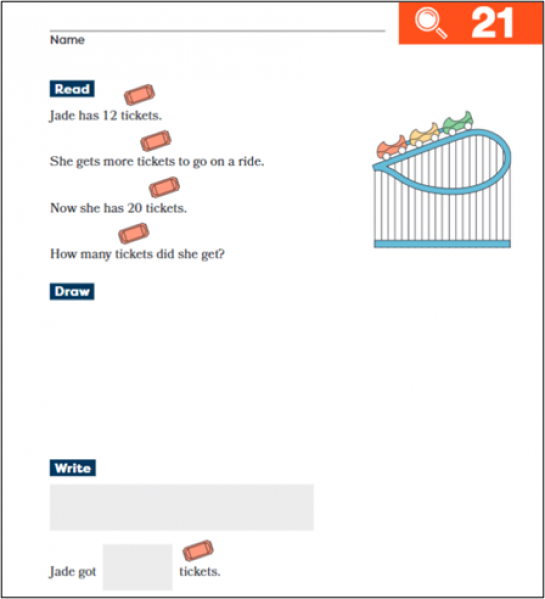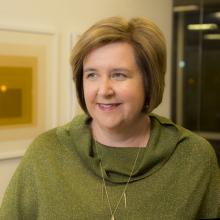ABC or 123? How Reading Can Get in the Way of Math Achievement and What to Do About It
What’s makes this word problem difficult to access? Hint: It’s not the math.
|
Rachel has 12 tickets at the carnival. She buys some more tickets to ride on the roller coaster. Now Rachel has a total of 20 tickets. How many tickets did Rachel buy to go on the roller coaster? Use the arrow way to show your simplifying strategy. Then write an equation with a question mark to show how you could find the unknown number of students. |
The math in this word problem has an appropriate amount of rigor for a first grader. The problem is with the words. There are too many of them, and some are too difficult for children who are just learning to read.
For instance, beginning readers may not be able to decode words such as Rachel, tickets, buy, roller, coaster, strategy, arrow, question, let alone the three-syllable words: carnival, equation, simplifying. What’s more, students have to wade through a lot of words before they get to the math content in the second sentence of paragraph two. Chances are, they’re exhausted by the time they even get there.
Most math materials, including some initially developed by my company, suffer from this same problem: readability. That’s bad news—not just for the millions of kindergartners and first graders who are just learning to read—but also for the millions of older students who struggle to read, including the estimated 20% of students with dyslexia.
I’m especially sensitive to the challenge of dyslexia since my 14-year-old daughter was first diagnosed with it in kindergarten and I’ve seen how that can impact math. Words should not stand in the way of learning math—or anything for that matter. A student's identity as a mathematician should not be dictated by their reading ability or confidence. We must create a culture of access and equity in classrooms by improving the readability and accessibility of text without in any way sacrificing grade-level rigor.
Look how much more accessible the math would be if a problem type like the one above was presented like this:
To address this, our math experts have spent the past two years also becoming experts in reading. Their goal: to make our materials more readable for children of all ages and reading levels.
They mastered readability indicators and learned about phonics, phonemes, and phonetic patterns. They became experts in decodability, dyslexia, and Universal Design for Learning theory.
They made student workbooks more student-friendly, with more white space, bigger type fonts and visual supports like icons, especially for the youngest readers.
Sentences are simpler, with few if any clauses with commas. Wherever possible, our teacher-writers avoided multiple-meaning words or similar-sounding words. They limited multi-syllabic words and used proper names that are more readable and diverse.
|
Before: After: |
To ensure both readability and rigor, math and reading experts worked together. We were careful to retain and support the academic vocabulary necessary for students to build their math knowledge and develop a math identity, even when the words are a little more difficult to read such as compose, measure, equation, or unknown.
In the end, we developed word problems that are more accessible without sacrificing the math. Teachers can focus on teaching the rigorous math that all kids deserve, and students have a better chance to experience the joy of math from the earliest ages.
As for my daughter, she now says math is her favorite subject. She took algebra in eighth grade and is enrolled in Geometry for ninth—ahead of many of her peers.

